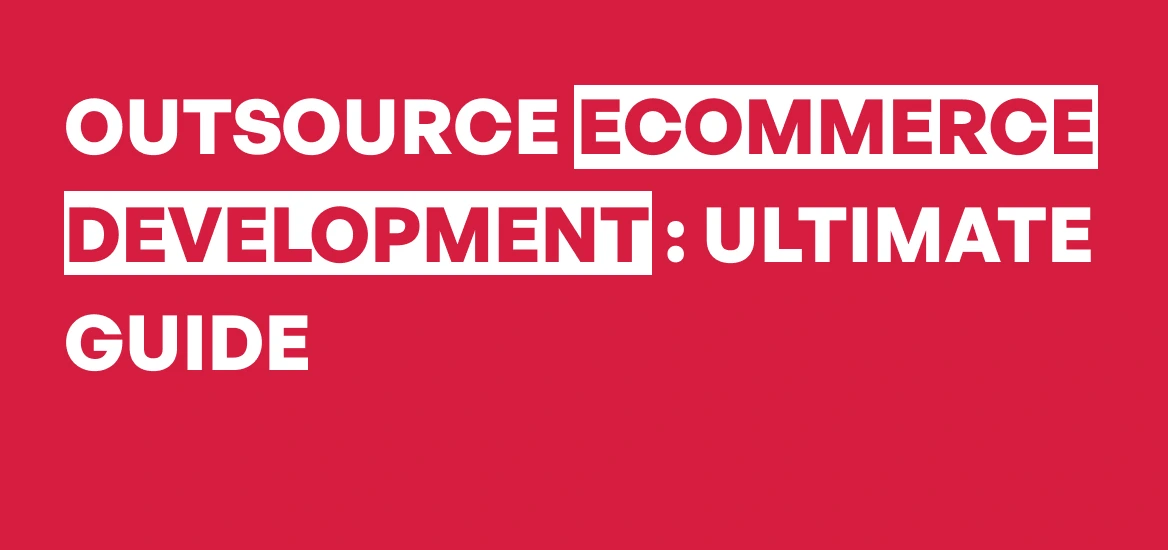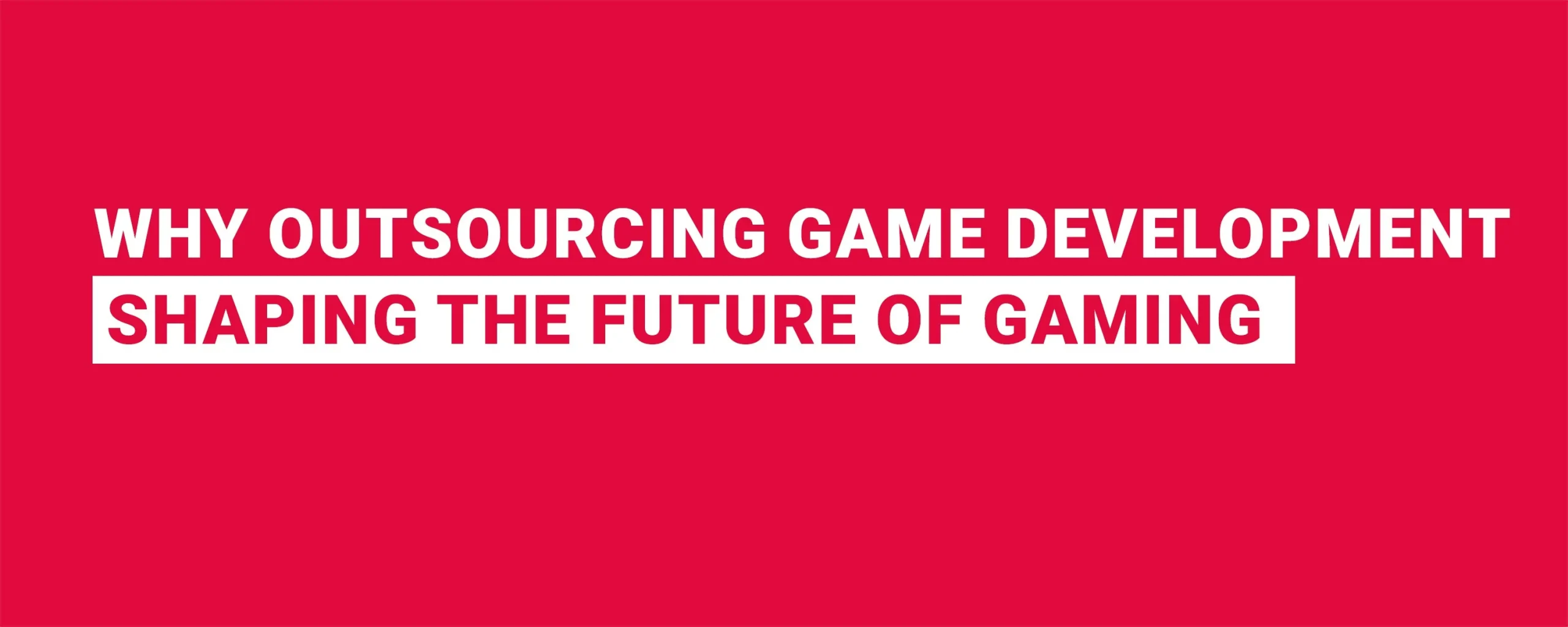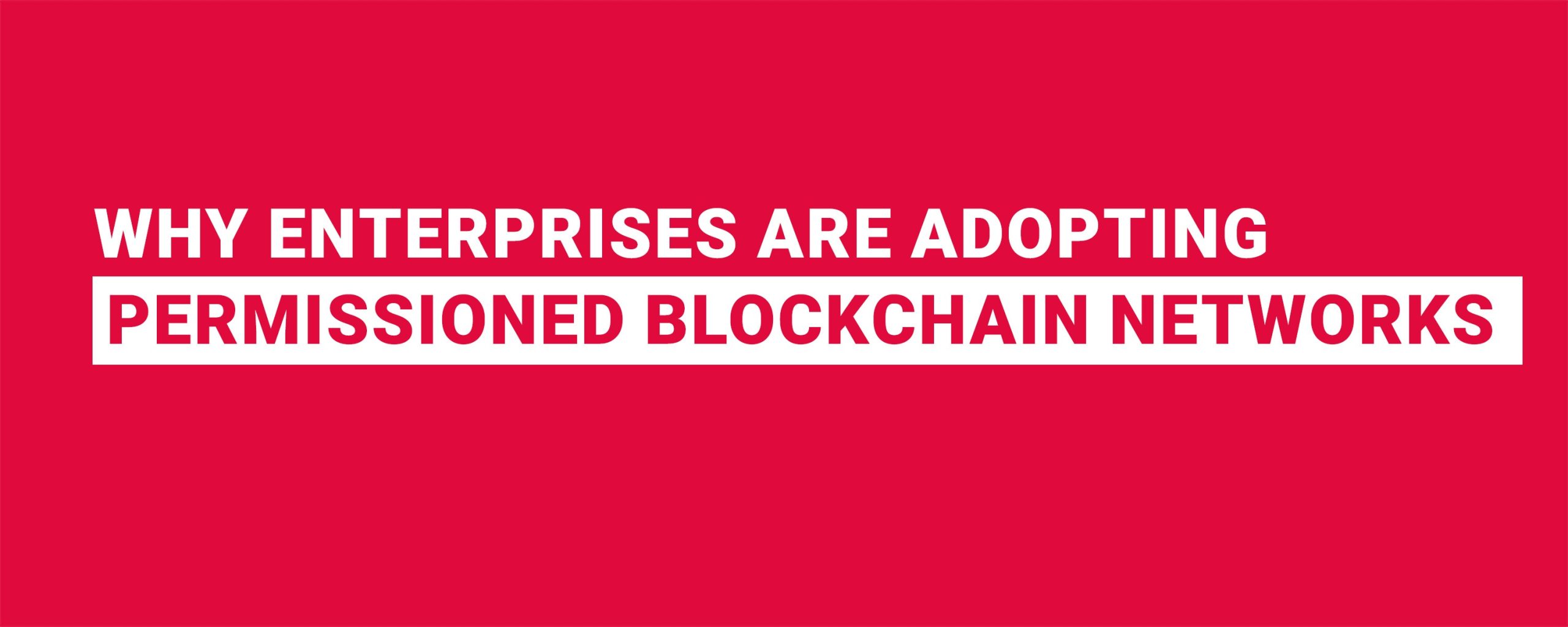Outsource Ecommerce Development: Ultimate Guide

Nowadays, having an online business has boomed the market and helps bring the business to its peak. It’s like a door of opportunity for entrepreneurs and companies looking to grow their businesses online. There are a number of benefits of delving into ecommerce app development that have the potential to grow the business globally. However, developing an ecommerce platform requires as much as setting up a physical store. Hence, for a business a guide to outsource ecommerce development team is a must.
In order to grow a business by developing an ecommerce app requires designing and other technical skills for the storefront. However, one of the feasible ways is to outsourcing ecommerce development. An outsourced ecommerce development company can help to develop key aspects like app design and development, payment system, management using an admin panel, etc.

What is Ecommerce Outsourcing?
Ecommerce Outsourcing, in simple terms, is contracting with a third-party provider or an ecommerce app development company to develop an ecommerce app. Here, the ecommerce app developers help to develop ecommerce platforms on platforms like Shopify, Magento, WooCommerce, BigCommerce, and custom frameworks. They also help to develop key aspects of ecommerce app development, including payment systems, inventory management, etc.
Difference Between: Ecommerce Outsourcing Vs In-House Ecommerce Development
Which is the best way to develop an ecommerce app? Many of the businesses are still confused about getting it outsourced or in-house development. The following table shows the key differences between ecommerce outsourcing vs in-house development.
| Criteria | Ecommerce Outsourcing | In-House Development |
|---|---|---|
| Cost | Comparatively, the cost is lower, due to a team of skilled ecommerce app developers | Higher due to salary & infrastructure cost |
| Talent | Specialized ecommerce experts with a pool of skills | Limited skill as per the recruitment |
| Time to Market | Pre-built workflows and an experienced team offer a faster marketing process | Comparatively slower as compared to outsourcing due to the hiring and onboarding process |
| Scalability | Highly scalable due to the large resources available | Less scalable due to hiring new team members |
| Expertise Level | High level of expertise to develop an ecommerce app for multiple platforms | Depends on the skill of the team being hired |
| Project Flexibility | More adaptability for Specific Projects | Good for long term project |
| Management Level | Lower Management Level as it is handled by the third-party | Higher management is required due to the internal team of developers |
| Technology Updates | Ecommerce app development companies stay updated with the latest technology, tools, and trends | In-house team requires regular training for the updates |
| Risk Level | Select the right development partner to lower the risk level | The risk level is lower due to the in-house team. |
Why Must Business Choose to Outsource Ecommerce Development?
Outsourcing ecommerce development means assigning the technical task of building an ecommerce app to a third-party service provider. But why must one choose to outsource ecommerce development? Here is the complete guide to eCommerce outsourcing.
- Cost-Effective Solution: One of the primary reasons for a business to outsourcing ecommerce development is its cost-effectiveness. It reduces the cost of development as hiring an in-house team of ecommerce developers is expensive. Whereas outsourcing can help to get skilled talent with the required experience who is updated with the latest technology and trends.
- Access to Skilled & Experienced Developers: Outsourcing can allow access to skilled ecommerce developers with different skill sets and experience levels. A business can get UI/UX designers, backend developers, and ecommerce strategies all under one roof. It provides innovative ecommerce solutions
- Focus on Core Business: It can help businesses focus on other core business activities. This can be a marketing strategy, customer service, supply chain management, etc. Not just developing a project, but better resource management can lead to good business growth.
Also Read : How to Start an Ecommerce Business from Scratch?
Guide to eCommerce Outsourcing
For a startup or existing business outsourcing helps to leverage external expertise and develop an outstanding ecommerce app. This leads to access to skilled and experienced developers, faster development, etc. The following shows the guide to eCommerce outsourcing –
1. Define Goals
Determine the goal with specific requirements for the aspect of developing an ecommerce app. Whether looking for website design, content creation, or just marketing. What is the goal in developing an ecommerce app? Set the sales goal with an immersive user experience. Evaluate the task accordingly, how much to outsource, and the remaining can be done with the in-house team.
2. Research & Find a Professional Provider
Research with different ecommerce app development companies that outsource projects and have good experience in ecommerce app development. Review them and go through their portfolios, which show their reliability. Evaluate their experience and skills in web development, design, and knowledge about the latest technologies, tools, and trends in the marketplace.
3. Communication
Define the roles and responsibilities & have a clear communication with the outsourced team. One can communicate with the development team via email, a project management tool, and video conferencing. One can use tools like Slack, Zoom, etc. as a medium of communication. Offer regular and timely feedback for better management so as to meet the business mission and vision.
4. Monitoring
Track the progress of the project from the team on specific time intervals. In case any issue or error is found, fix it immediately. Maintain regular check-ins and discuss the progress, and schedule a regular meeting. Build a good relationship with the outsourced team,m don’t just treat them as a service provider.
Also Read : Future Trends in Ecommerce App Development: What to Expect in 2025
5. Evaluation
Identify the area of improvement by the team and improve the performance. Refine the process by taking regular feedback from the outsourced team. Be open to feedback and know about how to improve it.
Key Benefits of Ecommerce Outsourcing
- Cost-effective: Outsourcing can help reduce the cost of the overall project, like training expenses, salaries, and other additional expenses.
- Access to Experienced Developers: One can access the experienced ecommerce app developers with their required experience level as per the project requirements.
- Faster Launch: As an outsourced team with extensive, well-experienced, they can accelerate the development process. Hence, this leads to a faster launch into the market.
- Focus on Other Business Cores: A business can focus on other activities like sales, marketing, resource management, customer service, etc.
- Advanced Technical Expertise: Outsourcing developers are updated with current trends, technologies, plugins, and protocols. Hence, these experts ensure delivery of high quality ecommerce development services that meet the business standards.
- Scalability: Looking to add new features in between development? Outsourcing companies can help to scale with the development and can adapt to the changes whenever required.
Also Read : 5 Ways an eCommerce Mobile App Development Company Can Boost Your Sales
Build Your Ecommerce App!

Conclusion
For a business or startup, it has been a strategic advantage to outsource ecommerce app development. This outsourcing helps to enhance faster development, where the business can focus on other core business activities. Not only this, it enhances the flexibility, innovation, and helps businesses to achieve their goal. However, the above guide to ecommerce development shows it all. Hence, partnering with the right ecommerce app development company helps to get a clear vision of the business with the perfect ecommerce app.
Frequently Asked Questions
Ecommerce outsourcing means hiring an ecommerce app development company or developer to handle some or all parts of your online store’s development. This can include website design, building the backend, creating mobile apps, or maintaining the site after it launches.
Outsourcing means hiring a third-party company to handle tasks, and that helps to develop an ecommerce app. Offshoring is a type of outsourcing where the company you hire is in a different country, usually where costs are lower.
Whether hiring in-house or outsourced, it all depends on the project requirements. If it is a long-term project, then in-house is the best option. In case of a cost-effective solution for large-scale projects, hiring an outsourcing ecommerce app development is the right choice to choose.
For a business, outsourcing ecommerce development helps save time and money while accessing expert talent from around the world. They have experience with multiple platforms and ecommerce trends. It’s a cost-effective way to get high-quality work without long-term commitment.
A basic ecommerce site may cost around $5,000–$10,000, while complex stores can range from $20,000 to $100,000 or more. Choosing the right ecommerce app development company can help manage costs effectively.
Look for an ecommerce outsourcing partner with experience in ecommerce, strong portfolios, and good client reviews. Get reviewed with their testimonials and their past work on platforms like Shopify or Magento. Initially, start with a small task, test their capabilities before committing to a long-term relationship
There is a wide range of ecommerce services to outsource. This includes website design, ecommerce store development, backend programming, mobile app development, payment gateway integration, SEO optimization, product catalog setup, and ongoing maintenance or tech support.
















